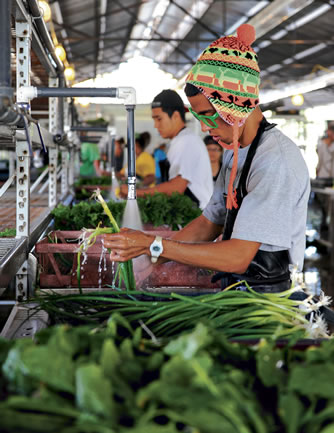Waianae Farmer In The National Spotlight
How a former high school dropout became an urban planner helping change how we grow our own food and how our youths look at the potential within themselves
Kamuela Enos strolls the grounds of MA’O Farms speaking of uplifting, enabling and mentoring. And he doesn’t mean vegetables. This fertile organic farm in Lualualei Valley is likely the only one in the state to employ a social enterprise director, and he’s it.
Dayton Windham
“I apologize for being all jazzed up about this,” he says, “but what you get from MA’O is a sense of joy, and like a wife giving birth – you earn your joy.” Enos does have a wife, Miwa Tamanaha, and a 3-year-old, plus another on the way, so he knows.
The past two years have been especially gratifying. His appointment to the President’s Advisory Commission on Asian Americans and Pacific Islanders has definitely opened doors and brought MA’O’s 11-year-old Waianae experiment into the national spotlight. After all, the 24-acre farm now boasts $650,000 in annual sales and is managed by student interns who have come up through the farm’s rigorous youth leadership training program that Enos oversees.
Optimism at UH-West Oahu has stirred further ideas about hands-on agro-ecology on the new campus for student interns balancing college with farm work. And a new partnership has taken off with MA’O, Searider Productions and its digital media whiz-kid grads (and powerful storytellers) at Makaha Studios. Enos predicts that the Kauhale ‘O Wai’anae venture – where he also directs social enterprise – should generate even more upward pathways for Waianae High graduates to walk.
It brings the talents of the video youths and the farm youths together to support each other in pursuit of higher ed and job internships. One example is their spring film nights – from 5 to 8 p.m. April 28 and May 19 at the farm’s outdoor amphitheater. The $20 admission ($10 for keiki) comes with an organic dinner, a screening and a talk story with directors and cast members: April 28 is Papa Mau, The Wayfinder and May 19 is Ingredients Hawaii. Proceeds support the group’s planned cultural exchange trip to New Zealand. (For tickets, call 696-5569 or email info@maoorganicfarms.org). See what 2012 farming is all about while munching some fresh arugula and kale salad.
“We don’t aim for new jobs – like when you wear a hard hat and guard a dump at 3 a.m,” points out Enos, who has worked at MA’O (Mala ‘Ai ‘Opio: “youth garden”) for four years. Local economic development is the key, he says, but the kind that creates meaningful jobs for young adults, and that are in sync with the best farming and conservation practices of their Hawaiian ancestors.
MA’O, he says, aims to raise up Waianae’s youths “so they stay out of the first five minutes of the TV newscast.” So far, it’s working, with West side high school graduates continuing to sign up and complete the farm’s two-and-a-half-year program of ag work, community college degree support and real-life money management.
“We’ve built a lot of sticks and carrots into it,” he explains. “If they flunk a class, they pay us back, and it’s three strikes and you’re out.” There was no welfare system in old Hawaiian society either, he notes. “Bad things happened to slackers.”
Enos himself, who is half Hawaiian, dropped out of Waianae High School, eventually earning his GED, his bachelor’s in Hawaiian studies and finally his master’s in urban and regional planning from UH-Manoa.
“I wish I could go back and whip my sorry 17-year-old (butt),” says Enos, now 38 and living in Waipio. But the consequence of that mistake was enlightening. “It was my professional development period: I realized what was out there for a high school dropout – nothing.”
All of which qualifies him for what he’s doing now. He’s an example of how anything is possible, even for a dropout. Humility helps, too. “Mostly now my job is to sit down and talk to people,” he says, while sitting and talking to a reporter.
“We’re not just a farm anymore,” he adds. Enos grew up on his family’s Kaala Farm, which also mentors youths and is still going strong. “But my dad (Eric) says you can no longer defend your farm from your farm.”
So Enos has taken the banner for sustainable island agriculture to Washington, D.C., and to West Coast college campuses in his capacity as a commissioner. And, thanks to the track record laid by MA’O Farms’ founders, Gary and Kukui Maunakea-Forth, the White House came to MA’O in November during APEC.
“They approached us,” he recalls, “and it just affirmed all of the work before that we were able to craft into our programs.”
First lady Michelle Obama visited MA’O for a lively dialogue – farmer to farmer – about getting everyone to eat more vegetables and staying the course for changing America’s eating habits. After all, she harvests about 2,000 pounds of produce a year from the White House’s backyard garden, and she comes from poverty on Chicago’s South Side.
Enos saw his interns step up and “learn to be comfortable speaking to power” that proud day, and they continue to stay in touch with “Auntie Michelle.” MA’O also grows activists like Uilani Arasato, 19, who has testified – in slam poetry style – on ag zoning issues that affect the Waianae Coast.
“The councilmembers were all shock and awe after I finished,” Arasato recalls, taking a break from washing produce. “I get my point across.”
Meanwhile, as a first-year intern, she realizes that MA’O is growing on her. “We’re creating something huge that’s gonna happen,” she says, “plus I’ve been getting into a healthy lifestyle without even knowing it.”
For more about the green ways of Waianae, check out maoorganicfarms.org.







